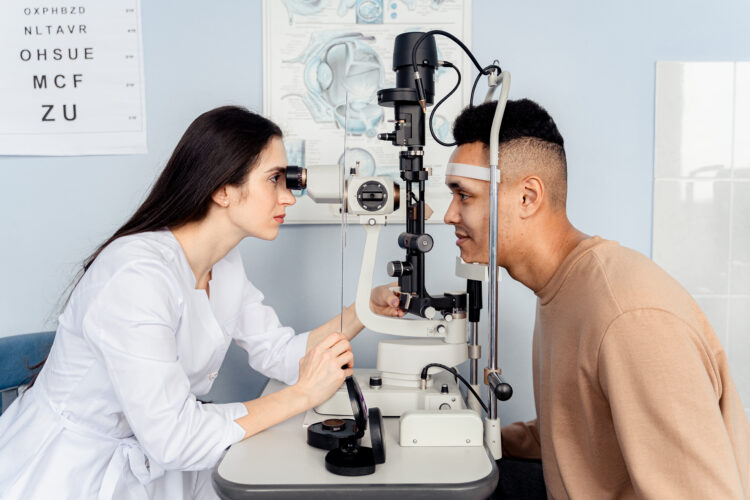Are you feeling itchy around your eyes? If so, it may be allergies. The eyes are one of the easiest places for allergic reactions to occur. Exposure to allergens such as pollen, mold, pet dander, and dust mites can cause increased swelling and itchiness.
If you don’t take steps to combat the issue, infections caused by staying too long and over-masturbating can occur too. Not only will this damage your eyes, but it can also be quite unpleasant, as well as damage the inside of your nasal passage.
Therefore, it’s important to know how to treat eye allergies. This ensures that you don’t suffer any further long-term damage.
Here’s how to do so:
Identify and Avoid Allergens
Start by paying attention to environmental and seasonal allergens like dust, mold, pet dander, and pollen. When outdoors, stay away from fields with pollen-producing trees or plants. Inside, reduce moisture to prevent the growth of mold. Keep pets out of the bedroom and vacuum regularly.
Wear a hat, sunglasses, and a face mask when doing yard work. Consider a skin test if exposures persist despite avoidance efforts. Additionally, take all medicines as prescribed by the doctor.
Reading Suggestion: Oh So Jack Fashion Male Grooming Lifestyle
Practice Good Hand Hygiene
This includes washing hands with soap and water, using an alcohol-based disinfectant, and avoiding contact with hands and eyes. Avoid touching the eyes with dirty or contaminated hands, as this can exacerbate an allergic reaction. Avoid rubbing the eyes, as this can transfer allergens from the hands into the eyes.
Also, avoid wearing contacts if the eyes are itchy or watery due to an allergy, as this can further irritate the eyes. Doing these small things can help reduce the severity of eye allergies, as well as prevent the spread of allergens from the hands into the face and eyes.
Protect Your Eyes with Sunglasses
To manage eye allergies, it’s important to avoid exposure to potential allergens by wearing protective sunglasses when outdoors. Sunglasses block pollen and other allergens from entering the eyes. They also lower the risk of inflammation by reducing the amount of ultraviolet (UV) light exposure, which can aggravate allergies.
Depending on the severity of your allergies, you may need to wear wrap-around sunglasses with polarized lenses that are designed to reduce UV rays.

Keep Windows Closed
During allergy season, be sure to inspect all windows and doors for any tears or weak areas that can act as a gateway for allergens. You can also upgrade to newer windows that are better insulated to keep the allergens out. If there is a window fan present, use a filter on the screen of the fan to reduce allergens coming in.
Invest in HEPA filter or air conditioners to further improve indoor air quality. Additionally, limit outdoor activity on high pollen count days to reduce exposure.
Reading Suggestion: Cool Math Games 66
Use Artificial Tears
Using artificial tears is one way to manage eye allergies. Artificial tears are specially formulated ophthalmic products that lubricate the eyes for relief from dryness and itching. They help to reduce inflammation and wash away allergens that may be causing irritation.
When selecting artificial tears, look for products that are free of preservatives and are appropriate for sensitive eyes. Begin by applying 1 to 2 drops in each eye as needed throughout the day, especially after spending time outdoors in high pollen areas.
Apply Cold Compresses
To help reduce the symptoms of an eye allergy reaction, apply cold compresses to the face periodically throughout the day. Take a clean washcloth and wet it with cold water or use an ice pack or frozen bag of vegetables, wrapped in a cloth, and place it gently over the affected eye or eyes for several minutes.
Avoid Rubbing Your Eyes
Rubbing has four main problems. Firstly, it irritates the eye even more, making the itch and watery sensation worse. Secondly, rubbing may push allergens deeper into the eye, further aggravating the symptoms.
Thirdly, rubbing the eyes can increase the risk of bacterial infections in the eyes, as your hands may contain bacteria or other microorganisms. Lastly, when you continually rub your eyes, you may damage the delicate skin and blood vessels around the eyes.

Maintain Clean Bedding
One way to manage eye allergies is to maintain clean bedding. Change sheets and pillowcases regularly and wash them in hot water, which kills dust mites and other allergens. Vacuuming the mattress and surrounding area is also important to reduce the presence of dust mites and other allergens.
Additionally, it is a good idea to use dust mite covers on mattresses and other bedding. Keeping your home clean, dust free, and free of pet dander can reduce the effects of eye allergies. Additionally, using humidifiers in areas of the home where allergens are present can help reduce the effects of eye allergies.
Reading Suggestion: Micro Bully: Everything You Need to Know About
Utilize Allergy Eye Drops
Before using any drops, you should speak with your doctor or healthcare provider to ensure they are the right treatment for your specific allergies. Once you know what type of drops to use, you can open the bottle and gently tilt your head back. Pull down the lower eyelid to form a pouch, and then drop the prescribed dose of drops into the pouch.
Close your eyes for a few seconds and blink the drops around your eye. Then, release the lower eyelid and gently press your finger to the corner of the eye, near the nose, for two minutes.
Consult an Eye Care Professional
It is important to seek medical help when the white part of eye swollen, so consulting an eye care professional is the best way to address the issue. An eye care professional can provide diagnoses and treatment plans, as well as advice and guidance.
Depending on the severity of the eye allergy, an eye care professional may prescribe eye drops or other medications. They may also recommend lifestyle changes, such as avoiding allergens as much as possible. Consulting a qualified eye care professional is the most effective way to manage and reduce the symptoms of eye allergies.

Don’t Let Your Eye Allergies Ruin Your Day – Manage Them Today!
Constant vigilance is key to managing eye allergies. An effective eye care treatment plan may also involve the use of eye drops and allergy pills. If you think you are suffering from itchy eyes, it is important to visit your doctor for an accurate diagnosis and treatment plan. Don’t hesitate to take action and take care of yourself today.
You can find more eye care tips along with helpful articles on this and other topics on our website.























